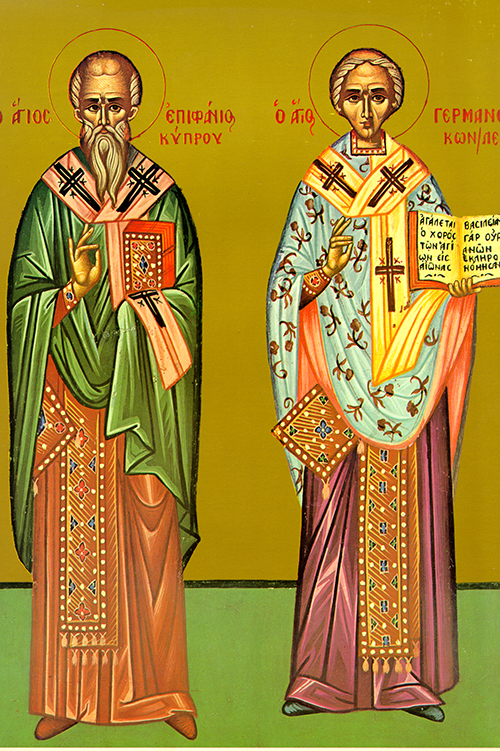

Our holy father Epiphanius, Bishop of Cyprus, “a last relic of ancient piety,” as St. Jerome calls him, lived during the fourth century in Phoenicia. The Roman empress Honoria was his sister. He was of Jewish descent, and in his youth he received a fine education. He was converted to Christianity after seeing how a monk named Lucian gave away his clothing to a poor person. Struck with the monk’s compassion, Epiphanius asked to be instructed in Christianity.
Our holy father Germanus, Patriarch of Constantinople, was born at Constantinople in the seventh century. His father, a prominent senator, was killed by order of the emperor Constantine Pogonatos (668-685). Because of the sanctity of his life, Germanus was made bishop in the city of Cyzicus. St. Germanus rose up in defense of the Orthodox Faith against the iconoclast heretics. He was later made patriarch of Constantinople. St. Germanus continued to stand up against the iconoclasts and to their spokesman, the heretical emperor Leo III the Isaurian (717-741). He went to a monastery, where he spent the remainder of his life. The holy Patriarch Germanus died in the year 740, at age ninety-five, and was buried in the Chora monastery in Constantinople. Afterwards, his relics were transferred to France.
O God of our ancestors, You always deal with us according to your everlasting compassion, take not your mercy away from us; but through the prayers of our ancestors, guide our lives along the ways of peace.
O faithful, let us sing a worthy hymn of praise in honor of the two glorious bishops, Epiphanius and Germanus. They enlightened the minds of those without faith, and to the faithful they presented God’s great mysteries, explaining true belief with great wisdom.
Acts 10: 1-16
In those days, in Caesarea there was a centurion named Cornelius, of the Roman cohort Italica, who was religious and God-fearing. The same was true of his whole household. He was in the habit of giving generously to the people and he constantly prayed to God. One afternoon at about three he had a vision in which he clearly saw a messenger of God coming toward him and calling, “Cornelius!” He stared at the sight and said in fear, “What is it, sir?” The answer came: “Your prayers and your generosity have risen in God’s sight, and because of them he has remembered you. Send some men to Joppa and summon a certain Simon, known as Peter. He is a guest of Simon the leather-tanner whose house stands by the sea.” When the messenger who spoke these words had disappeared, he called two servants and a devout soldier from among those whom he could trust. He explained everything to them and dispatched them to Joppa.
About noontime the next day, as the men were traveling along and approaching the city, Peter went up to the roof terrace to pray. He became hungry and asked for some food, and while it was being prepared he fell into a trance. He saw the sky open and an object come down that looked like a big canvas. It was lowered to the ground by its four corners. Inside it were all the earth’s four-legged creatures and reptiles and birds of the sky. A voice said to him: “Get up, Peter! Slaughter, then eat.” He answered: “Sir it is unthinkable! I have never eaten anything unclean or impure in my life.” The voice was heard a second time: “What God has purified you are not to call unclean.” This happened three times; then the object was snatched up into the sky.
John 6: 56-69
The Lord said to the people coming to him: “The man who feeds on my flesh and drinks my blood remains in me, and I in him. Just as the Father who has life sent me and I have life because of the Father, so the man who feeds on me will have life because of me. This is the bread that came down from heaven. Unlike your ancestors who ate and died nonetheless, the man who feeds on this bread shall live forever.”
He said this in a synagogue instruction at Capernum. After hearing his words, many of his disciples remarked, “This sort of talk is hard to ensure! How can anyone take it seriously?” Jesus was fully aware that his disciples were murmuring in protest at what he had said. “Does it shake your faith?” he asked them.
“What, then, if you were to see the Son of Man ascend to where he was before…? It is the spirit that gives life; the flesh is useless. The words I spoke to you are spirit and life. Yet among you there are some who do not believe.” Jesus knew from the start, or course, the ones who refused to believe, and the one who would hand him over.
He went on to say: “This is why I have told you that no one can come to me unless it is granted him by the Father.” From this time on many of his disciples broke away and would not remain in his company any longer. Jesus then said to the Twelve, “Do you want to leave me too?” Simon Peter answered him, “Lord, to whom shall we go? You have the words of eternal life. We have come to believe; we are convinced that you are God’s holy one.”
Icon courtesy of Jack Figel, Eastern Christian Publications – ecpubs.com
Sunday, May 11 –